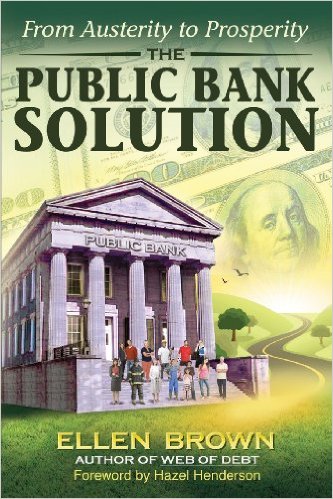www.aljazeerah.info
Opinion Editorials, April 2017
Archives
Mission & Name
Conflict Terminology
Editorials
Gaza Holocaust
Gulf War
Isdood
Islam
News
News Photos
Opinion Editorials
US Foreign Policy (Dr. El-Najjar's Articles)
www.aljazeerah.info
What a State-Owned Bank Can Do for New Jersey By Ellen Brown Al-Jazeerah, CCUN, April 17, 2017 |
 |
 |
|
Phil Murphy, the leading Democratic candidate for governor of
New Jersey, has made a state-owned bank a centerpiece of his campaign.
He says the New Jersey bank would “take money out of Wall Street and
put it to work for New Jersey – creating jobs and growing the economy
[by] using state deposits to finance local investments … and … support
billions of dollars of critical investments in infrastructure, small
businesses, and student loans – saving our residents money and returning
all profits to the taxpayers.”
A former Wall Street banker himself, Murphy knows how banking works. But in an April 7 op-ed in The New Jersey Spotlight, former New Jersey state treasurer Andrew Sidamon-Eristoff questioned the need for a state-owned bank and raised the issue of risk. This post is in response to those arguments, including a short refresher on the stellar model of the Bank of North Dakota (BND), currently the nation’s only state-owned depository bank.
Which Is Safer, a Public Bank or a Private Bank?
Sidamon-Eristoff warns, “[W]e need to remember that a public bank would be lending the state’s operating cash balances – we’re not talking about an enormous pool of unused, unencumbered cash – and that any repayment shortfalls or liquidity restrictions could potentially impact the availability of funds for employee salaries and other regular operating expenses.”
As the Bank of England recently confirmed, however, banks do not actually lend their deposits. The deposits at all times remain in the bank, available for withdrawal. They are no less available to the state when deposited in its own bank than in Bank of America. In fact, they are more at risk in Bank of America and other Wall Street banks, which with the repeal of Glass-Steagall are allowed to commingle their funds. That means they can gamble with their deposits in derivatives and other risky ventures, something a transparent and accountable state-owned bank would not be allowed to do.
Today, government deposits are at risk in private banks for another
reason. Banks across the country are telling governments of all sizes
that
they can no longer provide the collateral required to fully protect
these deposits while paying a competitive interest rate on them, due to
heightened regulatory requirements. FDIC insurance covers only the first
$250,000 of these deposits, a sum government revenues far exceed. The
bulk of these deposits are thus left insufficiently protected against a
banking collapse like that seen in 2008-09—something that is widely
predicted to happen again.
In North Dakota, by contrast,
state revenues are deposited by law in the state-owned Bank of North
Dakota and are guaranteed by the state. The BND pays a competitive
interest rate on these deposits that is generally
at about the
midpoint of rates paid by other banks in the state. The BND, in
turn, guarantees municipal government deposits, which are generally
reserved for local banks. Unlike in other states, where local banks must
back public deposits with collateral to an extent that makes the funds
largely unavailable for lending, North Dakota’s community banks are able
to use their municipal government deposits to back loans because
the BND provides letters of credit guaranteeing them.
The
concern that a New Jersey state-owned bank might make risky loans can be
obviated by limiting lending, at least initially, to the same sorts of
loans the state makes now, using the same underwriting standards.
Sidamon-Eristoff observes that “the state already maintains a
comprehensive range of economic development, infrastructure finance,
housing finance, and student assistance programs.” What financing
through the state’s own bank would add is leverage. State and local
governments routinely make loans through revolving funds, in which the
money has to be there before it can be lent out and must come back
before it is lent again. Chartered depository banks are allowed to
leverage their capital into 10 times that sum (or more) in loans,
acquiring the liquidity for withdrawals as needed from the wholesale
markets (Fed funds, the repo market or the Federal Home Loan Banks). A
bank with adequate capital will lend to any creditworthy borrower,
without first checking its deposits or its reserves. If the bank
has insufficient reserves, it can borrow from a variety of cheap sources
that are normally the exclusive province of the banking club, but that
local governments and communities can tap into by owning their own
banks.
That is one of the major benefits to the state of having its own bank: it can borrow very cheaply in the money markets. It can get the sort of Wall Street perks not otherwise available to governments, businesses, or individuals; and it is backstopped by the Federal Reserve system if it runs short of funds. This is the magic that allows banks to be so profitable, and it is what makes a publicly-owned bank exceptionally useful at state and local levels of government.
Cutting the Cost of Infrastructure in Half
Consider the possibilities, for example, for funding infrastructure. Like most states today, New Jersey suffers from serious budget problems, limiting its ability to make needed improvements. By funding infrastructure through its own bank, the state can cut infrastructure costs roughly in half, since 50 percent of the cost of infrastructure, on average, is financing. Again, a state-owned bank can do this by leveraging its capital, with any shortfall covered very cheaply in the wholesale markets. In effect, the state can borrow at bankers’ rates of 1 percent or less, rather than at market rates of 4 to 6 percent for taxable infrastructure bonds (not to mention the roughly 12 percent return expected by private equity investors). The state can borrow at 1 percent and turn a profit even if it lends for local development at only 2 percent—one-half to two-thirds below bond market rates.
That is the rate at which North Dakota lends for infrastructure. In
2015, the state legislature
established a BND Infrastructure Loan Fund program that made $150
million available to local communities for a wide variety of
infrastructure needs. These loans have a 2 percent fixed interest rate
and a term of up to 30 years; and the 2 percent goes back to the State
of North Dakota, so it’s a win-win-win for local residents.
The
BND is able to make these cheap loans while still turning a tidy profit
because its costs are very low: no exorbitantly-paid executives; no
bonuses, fees, or commissions; very low borrowing costs; no need for
multiple branch offices; no FDIC insurance premiums; no private
shareholders. Profits are recycled back into the bank, the state and the
community.
In November 2014, The Wall Street Journal reported that the BND was actually more profitable than the largest Wall Street banks, with a return on equity that was 70 percent greater than for JPMorgan Chase and Goldman Sachs. This remarkable performance was attributed to the state’s oil boom; but the boom has now become an oil bust, yet the BND’s profits continue to climb. In its latest annual report, published in April 2016, the bank boasted its most profitable year ever. The BND has had record profits for the last 12 years, each year outperforming the last. In 2015 it reported $130.7 million in earnings, total assets of $7.4 billion, capital of $749 million, and a return on equity of a whopping 18.1 percent.
The BND Partners, Not Competes, with Local Banks
Sidamon-Eristoff argues that “a new public bank would inevitably
compete against New Jersey’s private banks for routine business.” But
the BND does not compete with private banks either for municipal
deposits or for loans. Rather, it partners with local banks,
participating in their loans. The local bank acts as the front office
dealing directly with customers. The BND acts more like a “bankers’
bank,” helping with liquidity and capital requirements. By partnering
with the BND, local banks can take on projects in which Wall Street has
no interest, projects that might otherwise go unfunded, including loans
for local infrastructure.
The BND helps local private banks in other ways. It acts as a
mini-Fed for the state, providing correspondent banking services to
virtually every financial institution in North Dakota. It offers secured
and unsecured federal funds lines to over 100 financial institutions,
along with check-clearing, cash management and automated clearing house
services. Because it assists local banks with mortgages and
guarantees their loans, local banks have been able to keep loans on
their books rather than selling them to investors to meet capital
requirements, allowing them to avoid the subprime and securitization
debacles.
Due to this amicable relationship, the North
Dakota Bankers’ Association endorses the BND as a partner rather than a
competitor of the state’s private banks. Indeed, it may be the BND
that ultimately saves local North Dakota banks from extinction as the
number of banks in the US steadily shrinks.
North Dakota has
more banks per capita than any other state.
Bolstering the State’s Budget
The BND also helps directly with state government funding as needed. Between 2009 and 2016, the BND retained its profits because the state did not need them and the bank needed the additional capital for its rapidly expanding loan portfolio. But in December 2016, Governor Jack Dalrymple proposed returning $200 million from the bank’s profits to the state’s general fund, to help make up for a budget shortfall caused by collapsing oil and soybean proceeds. Dalrymple commented, “Our economic advisers have told us there is no similar state in the nation that could have weathered such a collapse in commodity prices without serious impacts on their financial condition.”
The BND also served as a rainy day fund when the state went
over-budget in 2001-02 due to the dot-com bust. The bank simply declared
an extra dividend for the state, and the next year the budget was back
on track: no massive debt accumulation, no Wall Street bid-rigging, no
fraudulent interest-rate swaps, no capital appreciation bonds at 300%
interest.
Having a cheap and ready credit line with the state’s
own bank can have similar benefits for New Jersey and other states. It
can reduce the need for wasteful rainy-day funds invested at minimal
interest in out-of-state banks; allow the state to leverage its funds,
expanding its current credit facilities without adding to the state’s
debt burden; cut infrastructure costs nearly in half; and jumpstart the
economy with new development, new employment, and an expanded tax base.
_____________________
Ellen Brown is an attorney, founder of
the Public Banking
Institute, a Senior Fellow of the
Democracy Collaborative., and author of twelve books including
Web of Debt and The Public
Bank Solution. She also co-hosts a radio program on PRN.FM called “It’s
Our Money.” Her 300+ blog articles are posted at EllenBrown.com.
***
Share the link of this article with your facebook friends
|
|
|
|
||
|
||||||


